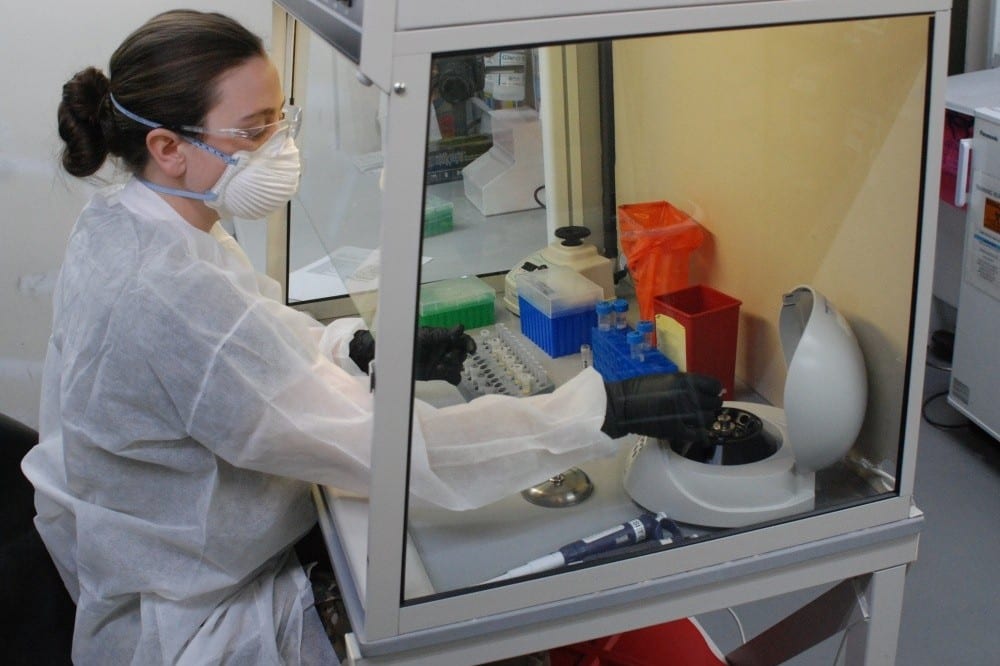Researchers at the U.S. Army Medical Research Institute of Infectious Diseases continue to work on medical countermeasures for the novel coronavirus as part of the Department of Defense COVID-19 research effort.
While some of USAMRIID’s programs were temporarily suspended due to potential safety issues, their ongoing work with SARS-CoV-2, the novel coronavirus, was never affected, according to U.S. Army Public Affairs.
The institute resumed full operational capability — for all of its programs — after a recent site visit by the Centers for Disease Control and Prevention, which was followed by a CDC letter dated March 27, 2020, that fully restored the institute’s registration under the Federal Select Agent Program.
“U.S. Army researchers were critical during the SARS epidemic, the Zika virus and the Ebola outbreak as they helped develop antivirals and vaccines,” said Ryan McCarthy, Secretary of the Army. “They’ve done it before and they will do it again.”
In July 2019, the CDC suspended USAMRIID’s registration to work with biological select agents and toxins (BSATs) due to issues with its biosafety program. This suspension became known to the public in late Aug 2019. Many of the cited problems stemmed from the failure of Fort Detrick’s steam sterilization plant, which forced USAMRIID to use a new chemical system for treating its laboratory wastewater.
In November 2019, the CDC issued a partial lifting of the suspension. Since then, USAMRIID had been working with BSAT in a limited capacity, with each set of studies reviewed and approved by Army leaders and the CDC.
Because the novel coronavirus is not classified as a BSAT, USAMRIID’s work on COVID-19 had been allowed to continue unimpeded.
U.S. Senators Chris Van Hollen and Ben Cardin along with Representatives David Trone and Jamie Raskin (all D-Md.) applauded the CDC’s decision to approve USAMRIID’s return to full operational capacity.
“USAMRIID conducts vital research on the spread and containment of infectious diseases. As we continue to battle the coronavirus outbreak, ensuring their ability to work at full capacity is more important now than ever. We fought hard to ensure USAMRIID had the resources necessary to receive CDC approval and get back up to full operational capacity. We will continue working to support funding for USAMRIID to carry out its crucial mission,”said Senator Van Hollen.
“The scientists and researchers at Fort Detrick have been on the frontlines of our nation’s battle with the coronavirus pandemic and I feel a tremendous sense of relief knowing that USAMRIID is returning to its full operational capacity,” said Congressman Raskin. “As the spread of COVID-19 has made all too apparent, the study of infectious diseases needs to remain a central pillar of our national security strategy and we must all do our part to ensure that USAMRIID has the resources needed to keep our country safe.”
Per USAMRIID, since 1969, the Institute has served as the DoD’s lead laboratory for medical biological defense research. USAMRIID protects the warfighter from biological threats and investigates disease outbreaks and threats to public health. Research conducted at USAMRIID leads to therapeutics, vaccines, diagnostics, and information that benefit both military personnel and civilians. USAMRIID is currently providing assistance in the response to the coronavirus outbreak as part of the DoD’s Global Emerging Infectious Surveillance program. USAMRIID is also duplicating samples of the coronavirus for vaccine development and sending reagents to detect for coronavirus to DoD labs worldwide. USAMRIID also provided critical research in the fight against Ebola, and their efforts are still being used in the treatment and containment of that disease.
USAMRIID is the only laboratory in the DoD equipped to study highly hazardous viruses requiring maximum containment at Biosafety Level 4.
Related:
- Why is the Defense Department Withholding Funding for USAMRIID and CCDC Chemical Biological Center? Feb 2020
- CDC Approves Partial Resumption of USAMRIID Select Agent Research Nov 2019
- Lawmakers Seek Answers on USAMRIID Shutdown, BioDetection 21 Capabilities Aug 2019
- Research Halted at USAMRIID Over Biosafety Issues Aug 2019



